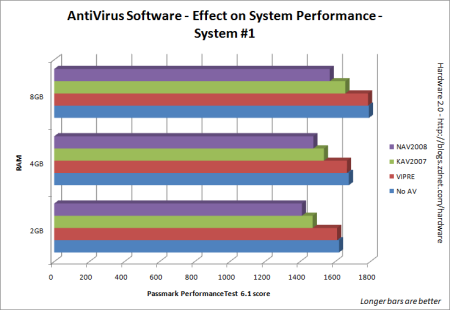VIPRE performance shoot-out - Does it really not slow down your PC?

[UPDATE: Many of you have asked about the effectivness of VIPRE. Testing security software is a big job and well outside of my capability. However, VIPRE has passed West Coast Labs' Checkmark certification. Details here. I am told that more certification is in the pipeline.]
The other day when I blogged about Sunbelt Software's latest VIPRE antivirus solution I took the claims that it doesn't slow down your PC pretty much at face value. Time to see if there's any validity to these claims.
Test system #1
- Quad-core Intel Core2 Extreme QX9650 3.0GHz
- DDR2 800 RAM (2GB, 4GB and 8GB)
- WD Raptor 150GB hard drive
- Vista Ultimate 64-bit SP1, fully patched up
Test system #2
- Pentium 950D processor (3.4GHz)
- DDR2 667 RAM (1GB, 2GB and 4GB)
- 250GB Maxtor hard drive
- Vista Home Premium 32-bit SP1, fully patched up
Note: When loaded with 4GB or RAM the 32-bit system registered 3.2GB of RAM.
Note: No optimizations were carried out on either system other than defragging the drive and making sure that all background tasks had finished.
Testing
Each system was imaged so that three antivirus products could be installed onto the OS (after testing the system was rolled back to the clean image).
The three antivirus products tested were:
- VIPRE
- Kaspersky AntiVirus 2007
- Norton AntiVirus 2008
All three products were fully updated before testing.
Note: All settings on each of the antivirus software packages was left in the default configuration.
Testing was done with PassMark PerformanceTest 6.1 (32-bit and 64-bit for the respective operating systems). For each test PassMark PerformanceTest 6.1 was run three times and the scores averaged to achieve the final score.
Note: Only the effect of background (or realtime) scanning was tested. Running the benchmark during a full system scan generated results that were too inconsistent to publish.
Results
The results here are quite staggering. While the effect that VIPRE had on system performance was indeed minimal (in the region of 1.5% to 2.0% for the 32-bit system, and around 0.5% for the 64-bit system), Kaspersky AntiVirus 2007 had a much larger effect (in the region of 15% for the 32-bit system, and around 8% for the 64-bit system), while Norton AntiVirus 2008 hit the system even harder (about 19% for the 32-bit system, and 12% for the 64-bit system).
Even without benchmarking the effect that Kaspersky AntiVirus 2007 and Norton AntiVirus 2008 had on the system could be felt while using the system. For applications which are designed to run in the background continuously, that's unacceptable.
I also tested how long it took each product to scan roughly 4.2GB of files on the 32-bit Vista Home Premium system fitted with 2GB of RAM. Here are the results:
In this test Norton AntiVirus 2008 doesn't come that far behind VIPRE, but Kaspersky AntiVirus 2007 is left trailing far behind.
The bottom line ...
Security software can have a shocking effect on performance, and can take a new system and make it feel like one that's a few years old. I'm pleased to see that Sunbelt Software's claim that VIPRE doesn't hog system resources and doesn't slow down a PC isn't just marketing hyperbole but is actually true. I hope that this move encourages other security software vendors to take a look at how well (or badly) their products affect system performance and take steps to reduce the effect that the software has on the user experience.
Attention Second Lifers: If you're an inhabitant of Second Life you can enter yourself into a daily draw to win a copy of VIPRE by going to the Sunbelt Software island and clicking on the appropriate displays situated around the main building (if you're into Second Life this should make sense to you, if not, it won't make a shred of sense!).
Thoughts?
<< Home >>
